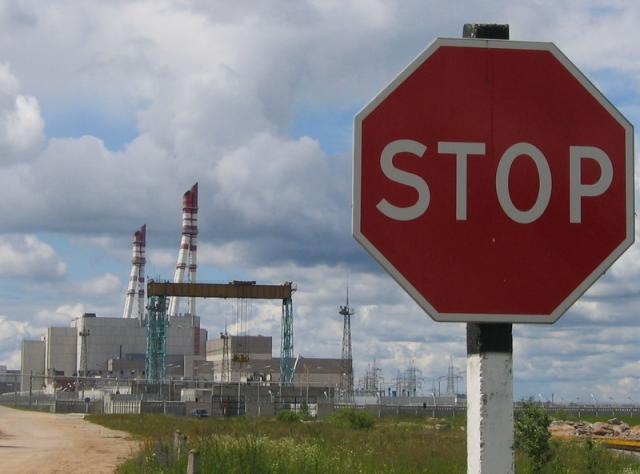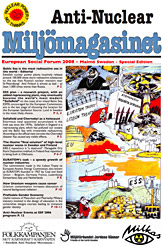Ignalina
 BALTIC NEWSLETTER OF THE GREEN WORLD December 23, 2009, № 105
BALTIC NEWSLETTER OF THE GREEN WORLD December 23, 2009, № 105
We congratulate Lithuanians with a nuclear electricity free life in 2010!
Information periodical of the environmental NGO GREEN WORLD, South Coast of the Gulf of Finland.
http://www.greenworld.org.ru/?q=ang_bv105
www.greenworld.org.ru www.decomatom.org.ru
Lithuania will stop nuclear electricity Generation on December 31, 2009!
“On 31 December 2009 at 23.00 Victor Shevaldin, Director of the Ignalina Nuclear Power Plant (INPP) will give the command to turn off the second and last energy bloc with reactor type RBMK-1500 with a power of 1500 MW. In this way, a NPP with the two largest-in-the-world energy blocs of Chernobyl-type will forever stop generating electricity.
The process of decommissioning of the Ignalina NPP will continue, as it is not possible to bring the safety of these reactors to modern European standards.
The Republic of Lithuania, which until 2005 had the highest percent of nuclear energy (80%) among nations, will become a country that completely has stopped the production of nuclear-generated electricity.
The closing of the Ignalina NPP will not lead to energy and social shocks either in Lithuania, nor in the nuclear power plant-city Visaginas (30 thousand residents).
This has become possible thanks to the multi-year program of preparation of decommissioning of the Ignalina NPP, and also the rebuilding of the social infrastructure of the neighboring town. The town of Visaginas is practically a part of the NPP, and the largest employer and source of finances for the town budget.
Ten steps on the way for Nuclear electricity free Lithuania:
1. The drawing up of an energy scenario of development of Lithuania without the Ignalina NPP, with the introduction of a “cold reserve” of natural gas power plant, of the development of energy conservation (potential of 40%), and also of the development of renewable energy sources. The potential of wind energy 1200 MW on land and 1000 MW at sea, of solid biomass 36 petajoule (1 petaJoule = 1015 Joules), biogas 1.5 petaJoules, and energy forest 40 petaJoules;
2. The acceptance of a plan for the decommissioning of the Ignalina NPP without waiting several decades. The construction of a “dry” temporary storage site for the spent nuclear fuel. As a result the majority of the personnel of the Ignalina NPP will be used in the work for the decommissioning of the Ignalina NPP to a condition of “brown field”;
3. A wide involvement of the public (tens of non-government organizations) in the working out of the strategy of development of the town of Visaginas, and other parts of Lithuania;
4. The creation of a publicly transparent national fund for the decommissioning of the Ignalina NPP. The cost of decommissioning of the Ignalina NPP (2 × RMBK-1500) will be about € 2.5 billion and will take 25 years (from 2005 to 2030). Future generations of Lithuanian citizens will solve the problem of nuclear waste.
5. Restructuring of the Ignalina NPP and its transformation into several independently operating companies, cooperating among themselves in market conditions;
6. The transfer of the management of the social infrastructure of the town from the NPP to local government;
7. The acceptance (first in the world) of a Law on Social Guarantees for the workers of the Ignalina NPP, as it undergoes decommissioning;
8. Opening in Visaginas of a business incubator for the development of small and medium business, creating new jobs;
9. The organizing of a University for Adult Education, for additional education and the preservation of the socially active status of the veterans of the INPP;
10. The allowance of the workers of the Ignalina NPP, who are Russian Federation citizens, the right to choose the local government of the Lithuanian city of Visaginas.”
We congratulate Lithuanians with a nuclear electricity free life in 2010!
From January 1, 2010, RBMK reactors (Chernobyl type) reactors continue operation only in Russia.
************************************************************************************************************
the issue was prepared by
Oleg Bodrov, Saulius Pyksris, Nathaniel Trumbull
tel. +7 921 74 52 631
P.O. Box 93/7, Sosnovy Bor 188544, Leningrad Oblast, Russia
Tel./fax: +7(81369) 72991; е-mail: bodrov@sbor.net


